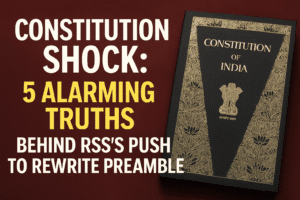Constitution Shock: 5 Alarming Truths Behind RSS’s Push to Rewrite Preamble
Supriya Sule firmly rejects RSS calls to alter the Constitution’s Preamble, declaring it the sacred outcome of exhaustive deliberation and vowing no changes will be permitted. While acknowledging Dattatreya Hosabale’s democratic right to speak his view – questioning the Emergency-era insertion of “socialist” and “secular” – Sule draws a definitive line at any actual amendment. This clash transcends politics, striking at India’s foundational identity: Sule defends the Preamble as embodying immutable principles of pluralism and state commitment, while the RSS frames its critique as restoring the framers’ original intent. Sule’s invocation of Arun Jaitley subtly underscores how media attention fuels such debates, yet her unwavering stance reflects profound anxiety over preserving the constitutional covenant.
Ultimately, this confrontation forces a vital national question: where does respectful reinterpretation end and dangerous reframing of India’s democratic soul begin? Vigilance, Sule signals, remains the price of safeguarding this hard-won legacy.

Constitution Shock: 5 Alarming Truths Behind RSS’s Push to Rewrite Preamble
Supriya Sule’s firm rebuttal to RSS calls for altering the Constitution’s Preamble transcends a mere political tit-for-tat. It strikes at the heart of India’s democratic identity, raising profound questions about foundational principles and the boundaries of discourse. Here’s a deeper look beyond the news bytes:
The Core Conflict: Sacred Text vs. Evolving Document?
- Sule’s Uncompromising Position: The NCP(SP) leader framed the Constitution not just as law, but as the immutable outcome of “extensive debate and deliberation.” Her declaration, “We will not let anyone change the Constitution in this country,” positions it as a near-sacred covenant, reflecting a widespread view across many opposition parties and sections of civil society. This stance emphasizes preservation over potential reinterpretation.
- RSS’s Historical Argument: RSS General Secretary Dattatreya Hosabale’s call to revisit the words ‘socialist’ and ‘secular’ hinges on a procedural point: these terms were added via the 42nd Amendment during the Emergency (1976), not present in the original 1950 Preamble. The RSS argues this insertion occurred during a period of democratic suspension, questioning its legitimacy and suggesting a review aligns with the original framers’ intent.
- The Unspoken Weight: Beneath this technical debate lies a significant ideological chasm. For critics of the RSS, removing ‘secular’ and ‘socialist’ signals a move away from pluralism and state-led welfare – core tenets for many. For proponents, it represents a correction, restoring the Constitution’s supposed neutrality on economic models and religion.
Sule’s Nuance: Defending Principles While Upholding Speech
Crucially, Sule didn’t demand silence. Her repeated emphasis – “in a democracy, everybody has the right to speak” and “He said what he felt” – acknowledged Hosabale’s right to express his view. This is vital democratic hygiene. However, she drew a sharp line at the action of altering the document itself. Her invocation of the late Arun Jaitley’s quip about media amplification highlighted a political reality: controversial proposals often gain traction through the oxygen of publicity.
The Lingering Shadow of the Emergency
Hosabale’s comments, made at an event marking 50 years of the Emergency, deliberately linked the Preamble amendment to that dark chapter. This connection serves as a potent rhetorical tool, framing the current Preamble as potentially tainted by authoritarianism. Sule’s counter-frame positions any attempt to change it now as a similar assault on democratic foundations.
The Tangential, Yet Telling, Language Row
Sule’s critique of making Hindi compulsory in Maharashtra primary schools, while a separate state issue, underscores a recurring theme: imposition versus choice. Her pointed question – “When Hindi is not compulsory everywhere, then why is it being made mandatory in Maharashtra?” – resonates with the larger Preamble debate. It touches upon fears of homogenization versus the celebration of India’s diverse, federal character – a character implicitly protected by the constitutional structure she defends.
Why This Matters: More Than Just Politics
- Defining the Nation’s Soul: The Preamble isn’t just an introduction; it’s the declaratory soul of the Indian state. Debating its words is debating India’s self-proclaimed identity – secular, socialist, democratic, republic.
- Testing Democratic Resilience: Can foundational principles be openly debated without endangering the foundation itself? Sule’s stance suggests some lines are inviolable, while acknowledging the right to discuss them.
- Historical Legacy vs. Contemporary Interpretation: The debate forces a confrontation between the original 1950 text, the 1976 amendments made under duress, and modern interpretations of what best serves India today. There are no easy answers, only deeply held convictions.
- The Power of Narrative: Both sides are wielding historical narratives – the exhaustive, inclusive Constituent Assembly process vs. the Emergency’s coercive amendments – to legitimize their positions. Understanding these narratives is key to understanding the conflict.
The Takeaway: Vigilance as the Price of Liberty
Sule’s forceful defense isn’t merely partisan. It reflects a deep-seated anxiety among many Indians about preserving the constitutional framework as they understand it. The RSS’s call, conversely, reflects a persistent desire to reshape that framework to align with a different ideological vision. This clash underscores a fundamental truth: a living constitution requires constant vigilance. Citizens must engage not just with what is being debated – the words ‘socialist’ and ‘secular’ – but why the debate is happening now, the historical arguments employed, and the profound implications for the world’s largest democracy. The right to speak is essential, but the wisdom to discern which ideas strengthen the republic and which might fracture it remains the ultimate civic duty.
You must be logged in to post a comment.